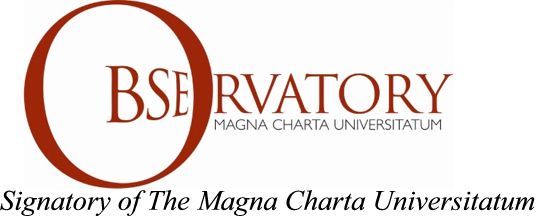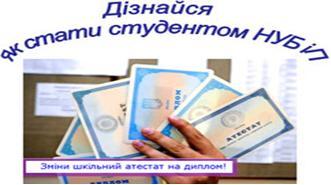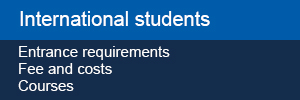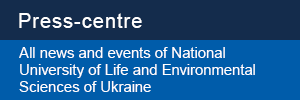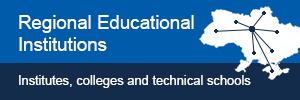Ukraine’s Image in Scientific Discourse: From Development Strategies to Practical Aspects of Nation-Building
On May 01, 2025, at the initiative of Department of Philosophy and International Communication of Faculty of Humanities and Pedagogy, International Scientific and Practical Conference “International and Intercultural Communication in Shaping Ukraine’s Image: Development Strategies” was held at National University of Life and Environmental Sciences of Ukraine. The conference was co-organized by Hennadii Udovenko Diplomatic Academy of Ukraine at the Ministry of Foreign Affairs, University of Reading (UK), and Pomeranian University in Słupsk (Poland).
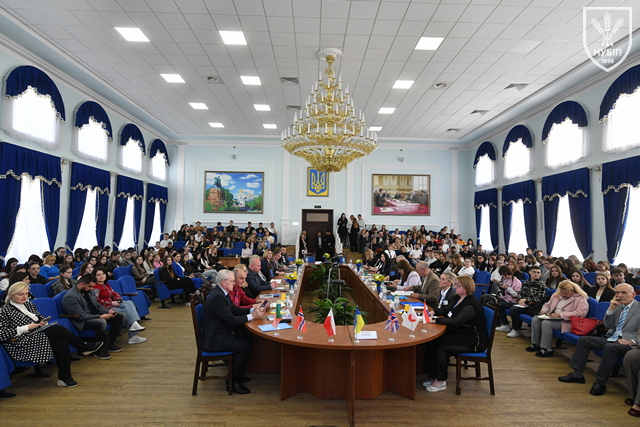
At the beginning of the conference, participants honored the memory of all Ukrainians who died during the war with a moment of silence. The selflessness and resilience demonstrated in the struggle for independence, sovereignty, and territorial integrity, as well as the heroism and strength of spirit of the Ukrainian people, have reshaped the world’s perception of Ukraine. The global perception of Ukraine, along with the role of international and intercultural communication in strengthening its reputation and authority, became key themes that defined the main directions of the conference.
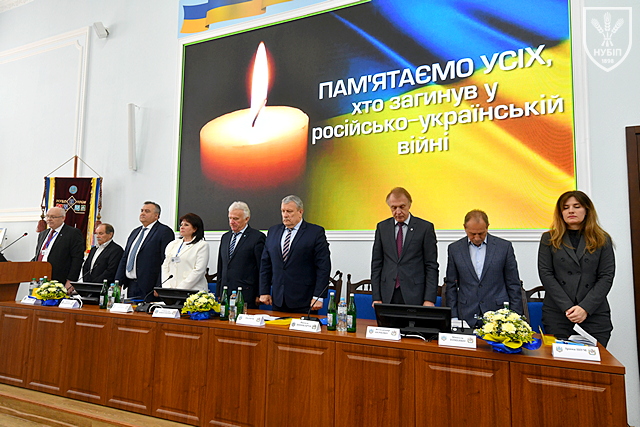
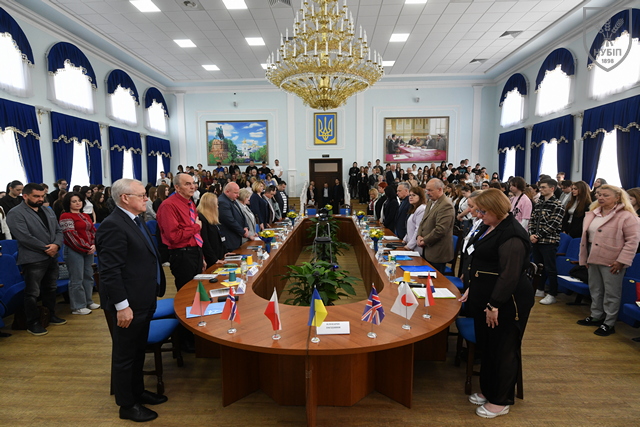
The conference purpose was to discuss and present to a wide audience modern approaches, strategies, and tools of international and intercultural communication in shaping Ukraine’s positive image internationally and to identify ways to integrate national cultural, social, and economic values into the global information space.
The conference was held in a hybrid format and brought together over 300 participants, including scholars, public figures, educators, postgraduate students, and undergraduates from various regions of our country (Kyiv Region, Volyn Region, Ivano-Frankivsk Region, Lviv Region, Ternopil Region, Kharkiv Region, and Mykolaiv Region) as well as from eight foreign countries (the United Kingdom, Poland, Japan, Luxembourg, Norway, the Czech Republic, Romania, and the People’s Republic of China). The keen interest of representatives from the academic community across different countries in the conference’s themes granted it international status and determined its working languages: Ukrainian, English, and Polish. Vasyl Shynkaruk, Doctor of Philological Sciences, Professor, and Svitlana Khrystiuk, Candidate of Historical Sciences, Associate Professor, moderated the event.
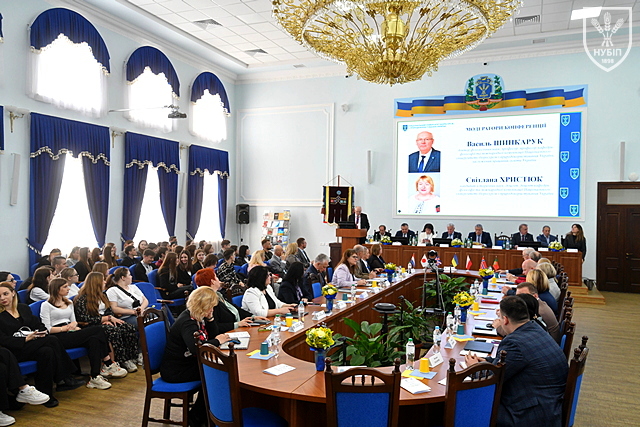
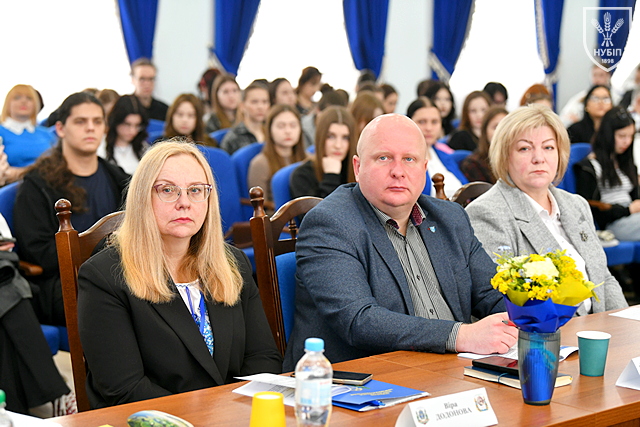
Vadym Tkachuk, Rector of National University of Life and Environmental Sciences of Ukraine, Doctor of Economics, Professor, welcomed conference participants. He emphasized the relevance of the event’s theme, highlighted the important role of international communication in shaping Ukraine’s image during wartime, noted that each of its citizens shapes the state’s image, called for fruitful work and wished participants meaningful discussions and exchange of views.
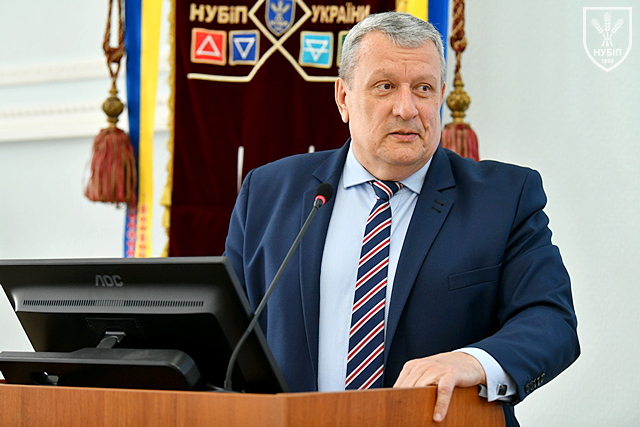
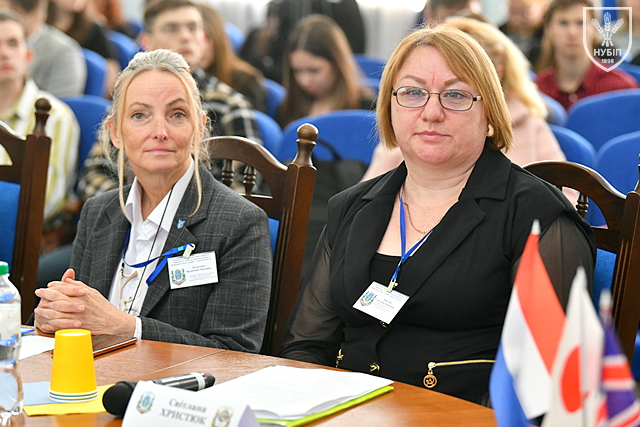
Stanislav Nikolaienko, President of National University of Life and Environmental Sciences of Ukraine, Doctor of Pedagogical Sciences, Professor, emphasized the quality of education at our university, which has produced many graduates over its 127-year history who have represented and continue to represent Ukraine’s interests internationally. The university creates conditions for high-quality training of specialists, their further career growth, and scientific research. Stanislav Nikolaienko wished everyone successful work and peace.
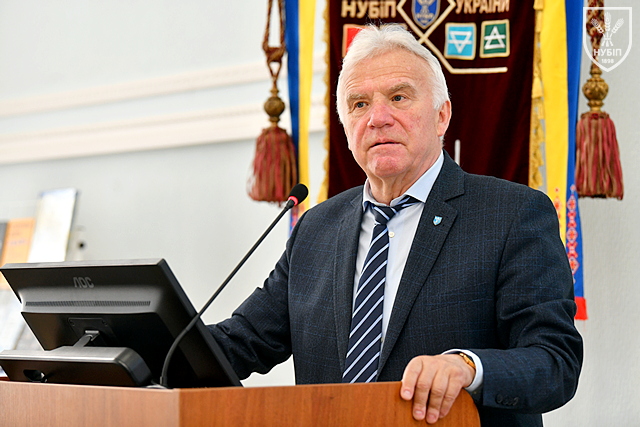
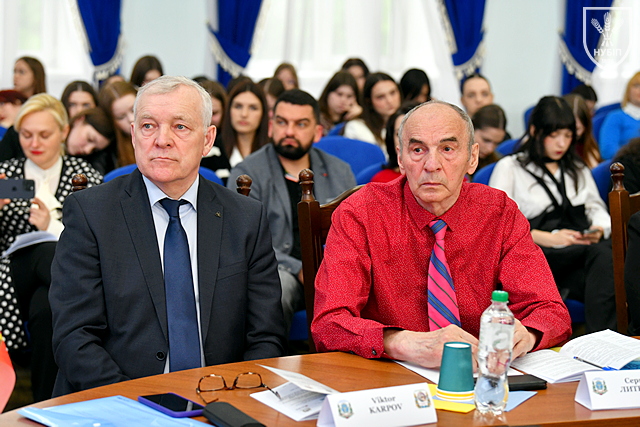
Oleksandr Yarema, State Secretary of the Cabinet of Ministers of Ukraine, addressed conference participants with a welcoming speech. He noted that today, Ukraine’s image is not just a concept shaped by media or branding, but also the result of daily efforts of each of us, which form Ukraine’s perception worldwide. Critically important during a time of full-scale invasion is how this perception can be transformed into support for Ukraine. Oleksandr Yarema emphasized the scientific and practical significance of the chosen theme, wished participants a fruitful discussion, and expressed hope that the ideas and thoughts voiced at the conference would find practical implementation in state-level documents and international cooperation agreements.
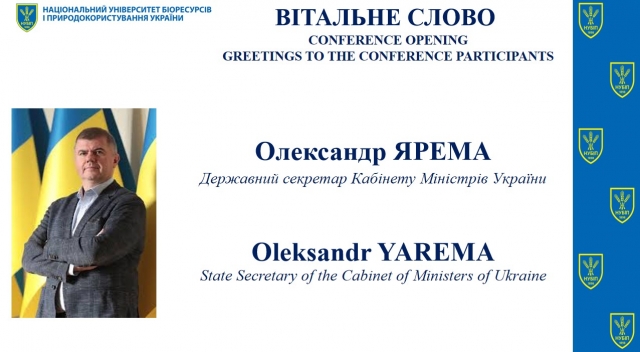
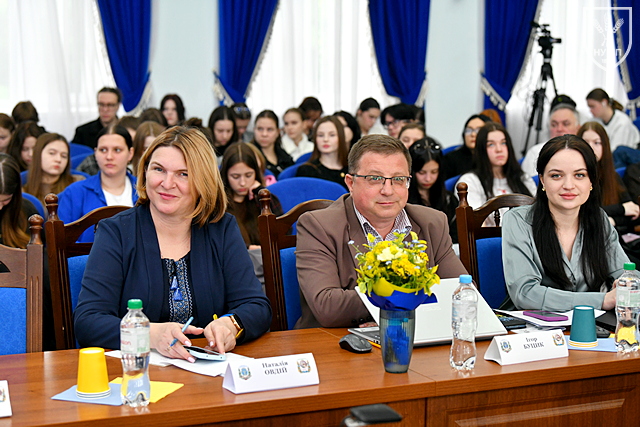
Volodymyr Ohryzko, Ambassador Extraordinary and Plenipotentiary of Ukraine, former Minister of Foreign Affairs, spoke about the connection between foreign and information policy, the important ability to convey truthful and reliable information about Ukraine in a timely and high-quality manner, to counter enemy propaganda that distorts facts, and emphasized the need for government support for initiatives and ideas regarding Ukraine’s positive positioning as an urgent issue in modern conditions.
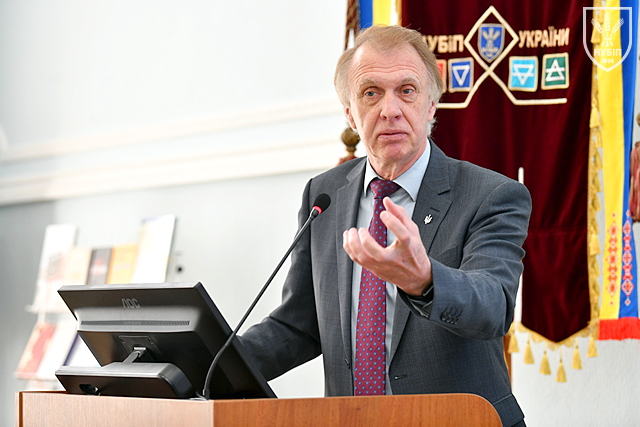
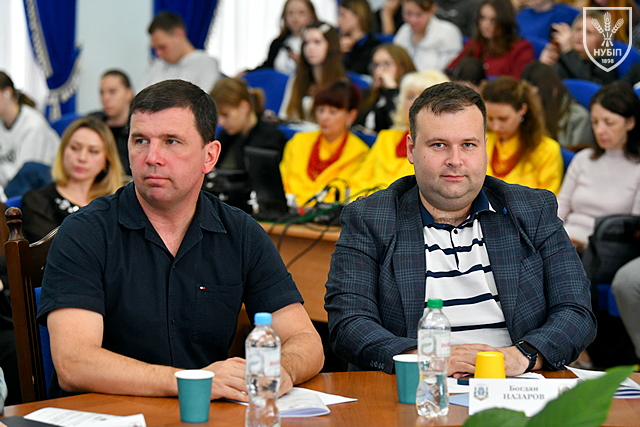
Hennadii Nadolenko, Director of Hennadii Udovenko Diplomatic Academy of Ukraine at the Ministry of Foreign Affairs, expressed his gratitude to organizers for invitation and opportunity to visit his Alma Mater, where he acquired knowledge and professional skills that later proved invaluable in his diplomatic career. He emphasized the relevance of the conference’s theme, which, in the context of today, is among the most critical for Ukraine. Hennadii Nadolenko highlighted the fruitful cooperation between the Academy and the University, outlined prospects for joint projects, and wished everyone a successful conference.
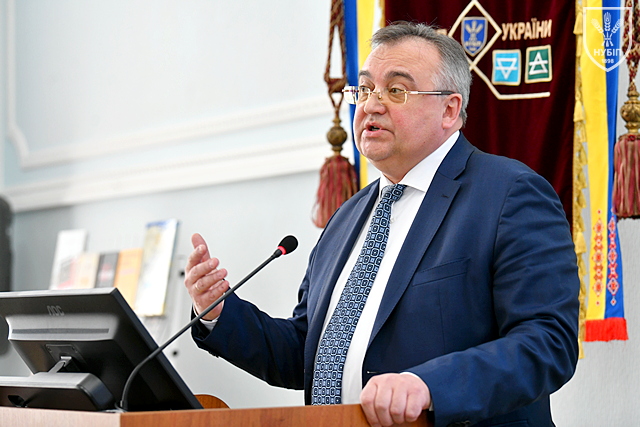
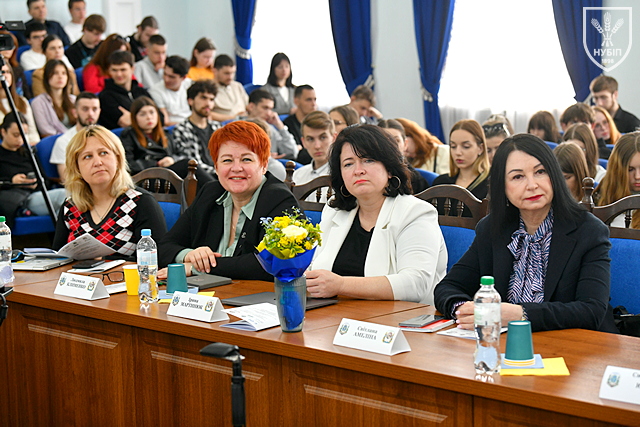
A representative of the co-organizing university, Dr. Izabela Szkurlat, Doctor of Philosophy in Social Sciences, Deputy Director for Research at Institute of Security and Sociology at Pomeranian University in Słupsk (Poland) also joined the greetings. She highlighted the continuing and promising cooperation between our two universities and wished the conference success in its proceedings.
Ivan Zaiets, Member of Parliament of Ukraine of the I–IV and VI convocations, a well-known public and political figure who participated in establishing the first institutions of our sovereign state, remarked that today, Ukraine’s image is being written with the blood of Ukrainian patriots. An image is not a stereotype and is shaped in two main directions: through our existence and purposeful efforts toward its development. Ivan Zaiets emphasized the need to adapt the image shaping to new realities by creating institutional infrastructure for this purpose, highlighting deep national traditions, demonstrating Ukraine’s historical roots and the state-building process.
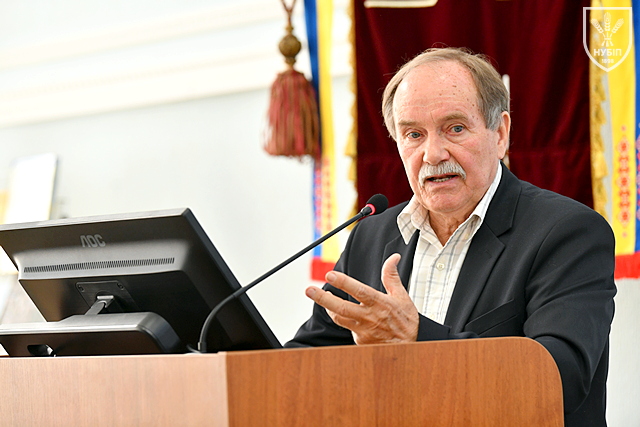
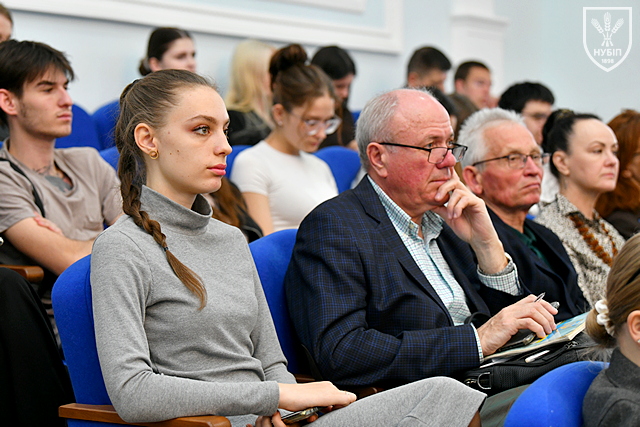
Inna Savytska, Dean of Faculty of Humanities and Pedagogy of National University of Life and Environmental Sciences of Ukraine concluded the welcoming part with wishes for successful work, new ideas, interesting and effective scientific communication to all conference participants.
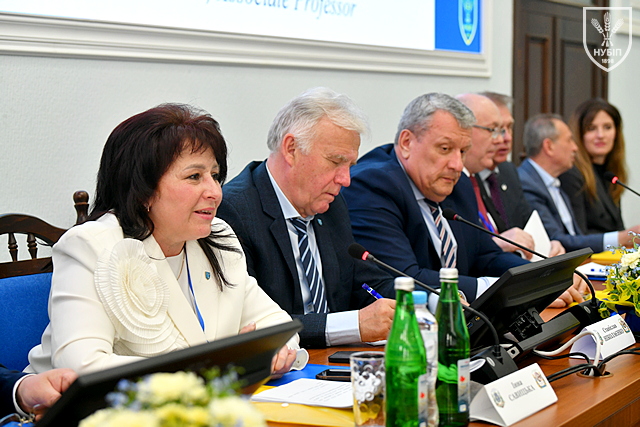
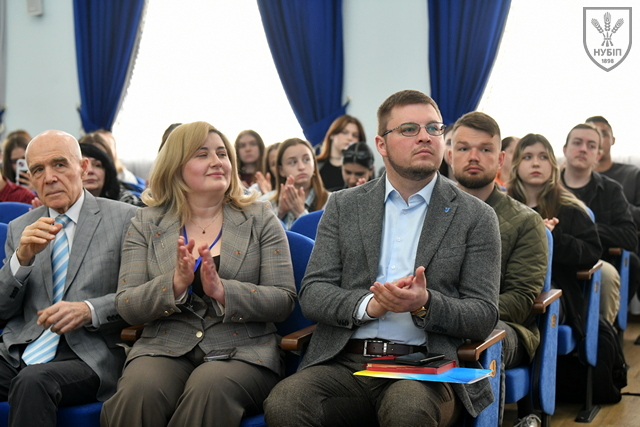
Vasyl Shynkaruk, Doctor of Philological Sciences, Professor, opened the plenary session with a keynote speech on the topic: “The Influence of International Communications on Shaping the State’s Image.” The main theme of his report emphasized that the shaping of a positive image of the state, supported by an effective communication strategy, should become a priority for Ukraine in the face of modern challenges. In the report prism, the entire range of issues addressed by the conference has been presented: historical, political, social, cultural, and other aspects of the problem have been examined, and prospects for its resolution have been outlined. The report has become a cornerstone of the event, not only in terms of content – bringing the key directions of the conference into focus – but also due to its presentation approach. To ensure effective communication, a bilingual slide format (in Ukrainian and English) has been chosen, maintaining a balance between scientific facts, reflections, and visual aids, as well as documentary and artistic video materials.
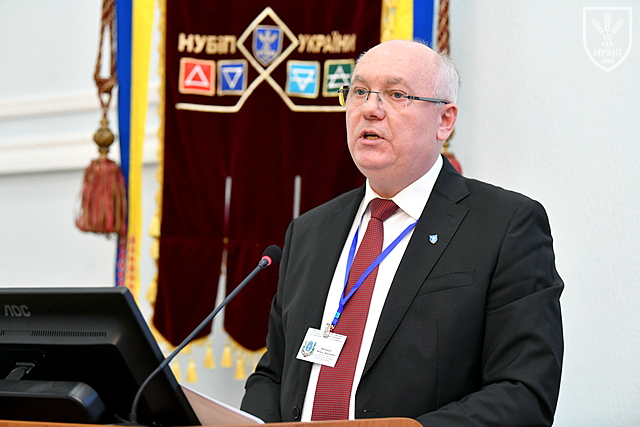




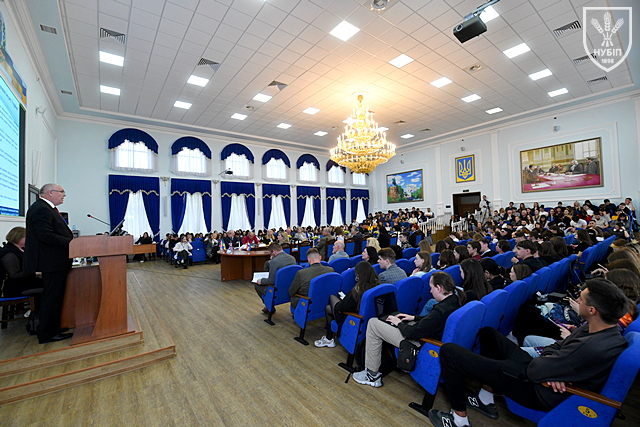
The scientific dialogue was continued by Eng Hai Tan, Associate Professor of Faculty of International Studies at Meio University (Okinawa, Japan) with a scientific presentation “Hearing the Unspoken: How Cultural Assumptions Shape Intercultural Communication”, which captivated the audience with its positive elegance of scholarly thought and presentation. The speaker began by addressing the paradox of intercultural communication, which lies in the idea that the more we communicate, the less we understand, noting that cultural differences are not limited to language, but also involve deep-rooted, unconscious structures that shape the way we perceive reality. Cultural assumptions act as invisible scripts, replicating patterns in individual minds, social behavior, and institutional norms. Eng Hai Tan has summarized, the unspoken becomes not merely an intellectual pursuit, but a moral imperative that demands awareness, adaptability, and curiosity with the rise of globalization.

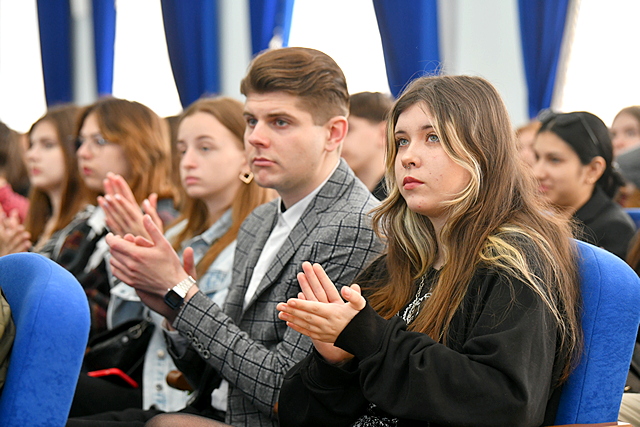
Mykola Tomenko, Doctor of Political Sciences, Professor, Head of Supervisory Board of National University of Life and Environmental Sciences of Ukraine, emphasized the importance of understanding historical facts. He addressed the issue of demythologizing Russian propaganda narratives about “history of Ukraine” for international community, focusing on three key aspects: the shaping of the imperial-Soviet-Russian version of Ukraine’s history, the debunking of major myths propagated by imperial-Soviet-Russian propaganda regarding “history of Ukraine” (such as origins of Ukraine’s name and the Pereyaslav legend), and the steps of Ukraine’s state policy in promoting a popular version of Ukraine’s history globally. His presentation was based on the results of joint research conducted with V. Pyrohovska.
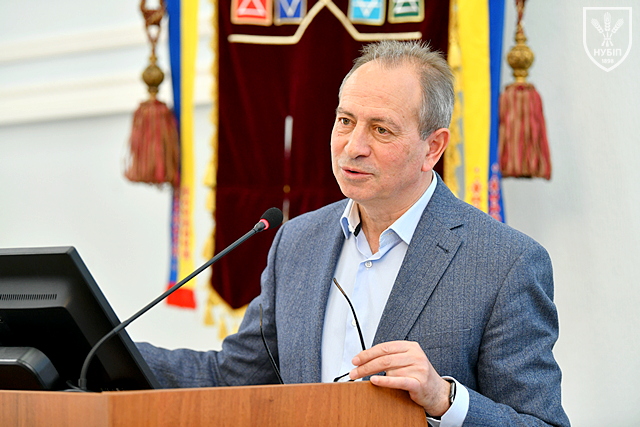
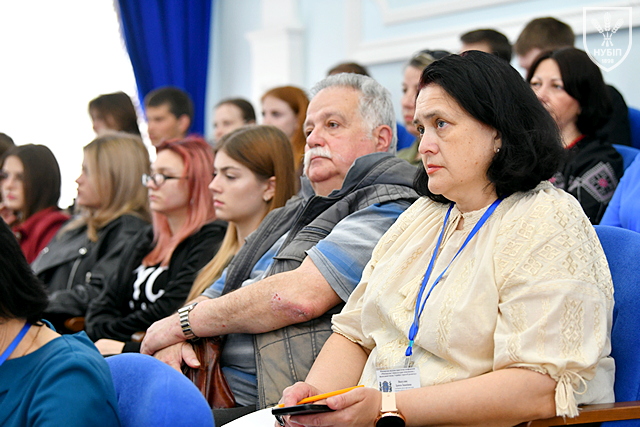
Iryna Shum, Deputy Director of Department of Public Diplomacy and Communications of the Ministry of Foreign Affairs of Ukraine, spoke about goals and objectives of public diplomacy in Ukraine. She elaborated on the prospects for their implementation in various areas, including cultural, digital, culinary, expert, economic, scientific-educational, and sports spheres, to promote national interests, preserve and promote Ukrainian identity, and ensure global support for Ukraine.
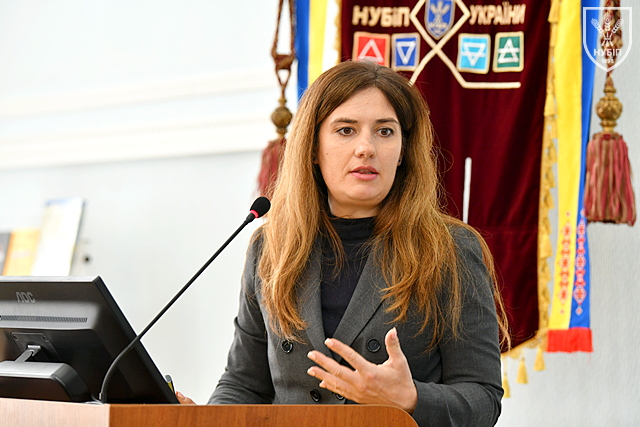
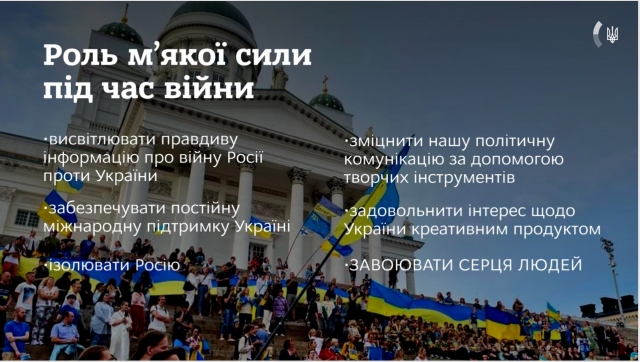
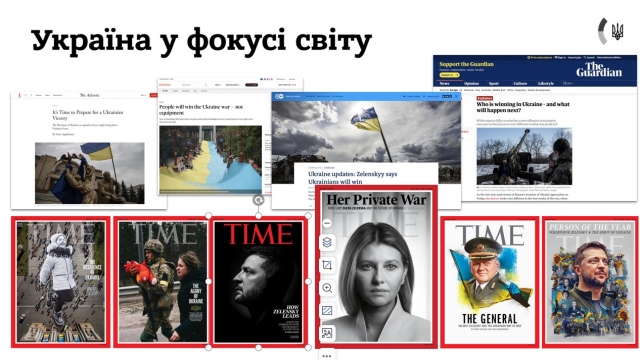
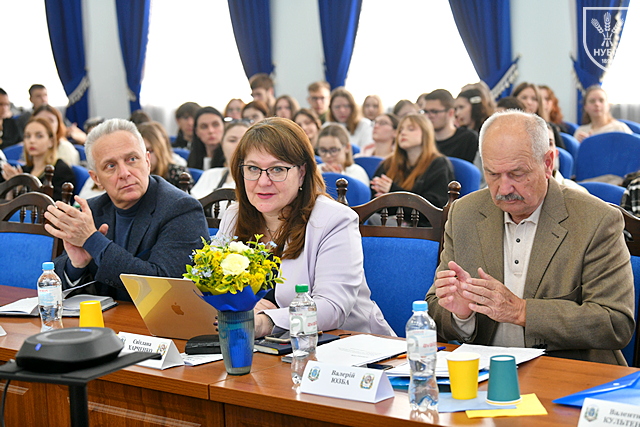
Ryszard Kozłowski, Doctor of Humanities in Human Philosophy, Professor of Pomeranian University in Słupsk (Poland), presented the role of the philosophy of safety and the culture of “safetism” in intercultural communication. This served as a scholarly counterpoint in a philosophical context to the issue of assumptions in international communication, previously raised by speaker Eng Hai Tan. Professor Kozłowski emphasized that intercultural communication is based on numerous philosophical, systemic, and political assumptions. Philosophical reflection in the safety sphere teaches openness and tolerance towards the values of other cultures, making us sensitive to other people and the cultures in which they live, which they protect for themselves and others. Finally, philosophy is deeply interested in dialogue and introduces dialogical thinking into the realm of culture. Thus, the philosophy of safety is not an abstract concept; it highlights the foundations of international communication in both a humanistic and existential senses.
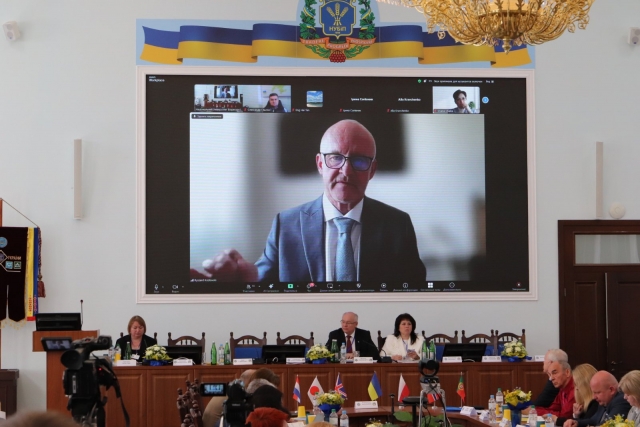
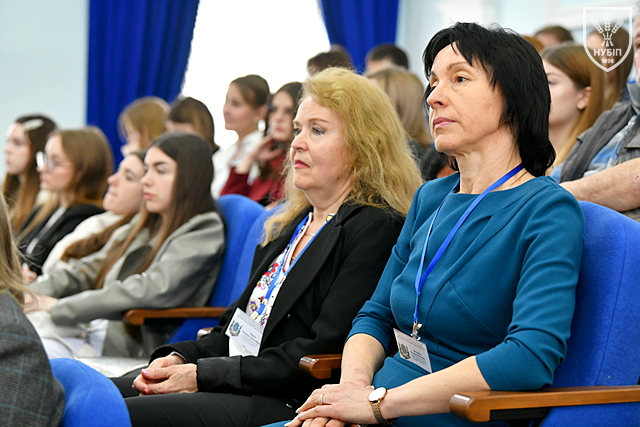
An example of effective international communication based on shared scientific and cultural interests has become the international scientific presentation “Ukrainian-Portuguese Cooperation in Publishing a Book on Ukraine’s Military Awards” delivered by Viktor Karpov, Doctors of Historical Sciences, Head of Department of Design at Borys Grinchenko Kyiv Metropolitan University, and Humberto Nuno de Oliveira, President of Portuguese Phaleristics Academy. The speakers highlighted that for a significant part of its modern history, Ukraine has been waging an uncompromising war for state sovereignty, territorial integrity, freedom and liberty of the Ukrainian people. The war prompts Ukrainian society to rethink its historical experience and seek the roots of national military identity as the foundation of societal stability and strength. In this context, Phaleristics has emerged as the moral basis of the Ukrainian code – a symbolic system affirming the supremacy of the spirit of justice and courage. The dramatic events in Ukraine have united scholars to study it.
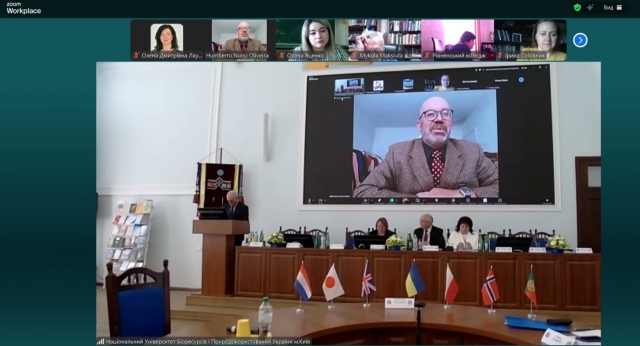
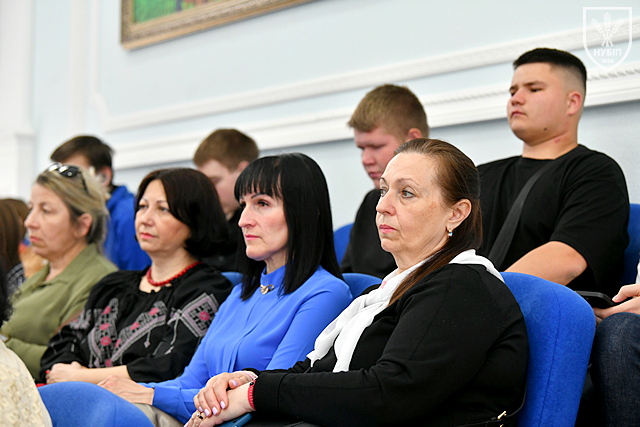
Valerii Yuzba, Candidate of Economic Sciences, Associate Professor of Department of Production and Investment Management at National University of Life and Environmental Sciences of Ukraine addressed the economic aspects of international communication in his scientific presentation. He focused on three main points: defining international communication in an economic context, analyzing how political or diplomatic language influences economic outcomes, and providing case examples, both global and U.S.-focused. These included U.S. trade rhetoric and its economic impact, WTO and global trade narratives, disinformation, propaganda, and economic warfare (Russia-Ukraine), as well as the European Union’s green diplomacy, among others. Valerii Yuzba concluded that communication could be viewed as an economic tool and an integral part of economic analysis.
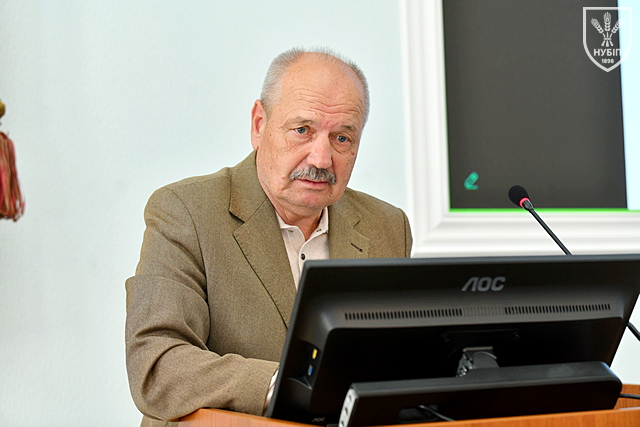
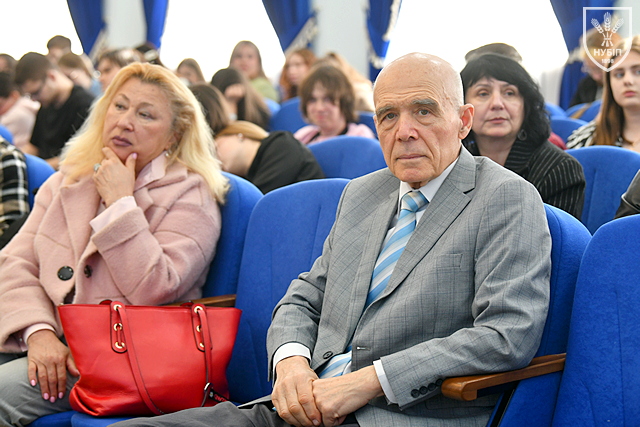
The cultural diplomacy arguments were presented by lecturers and students of Department of Cultural Studies: Presidential Scholar of Ukraine, Vladyslava Chaika, and a student of Faculty of Humanities and Pedagogy, Anastasiia Kulakevych (with songs “Our Nightingale Song” and “Ukraine, Be Happy”), as well as the trio “ToNika” (Head of Department of Cultural Studies, Iryna Maidaniuk, specialists Iryna Lytvynenko and Tetiana Symonenko with the song “”We Will Win!”).
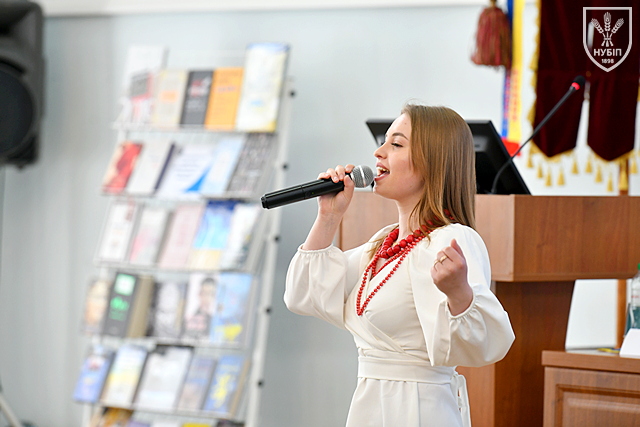
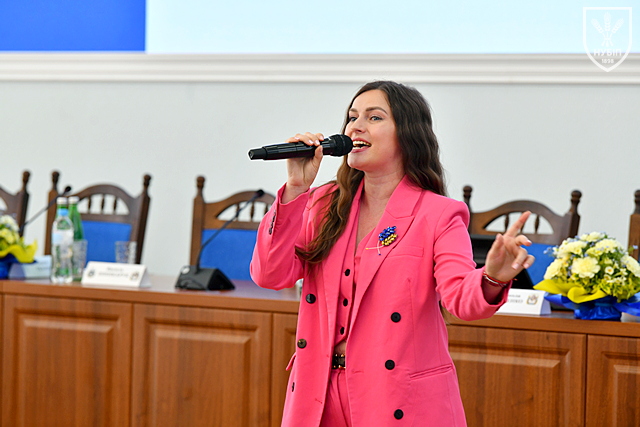
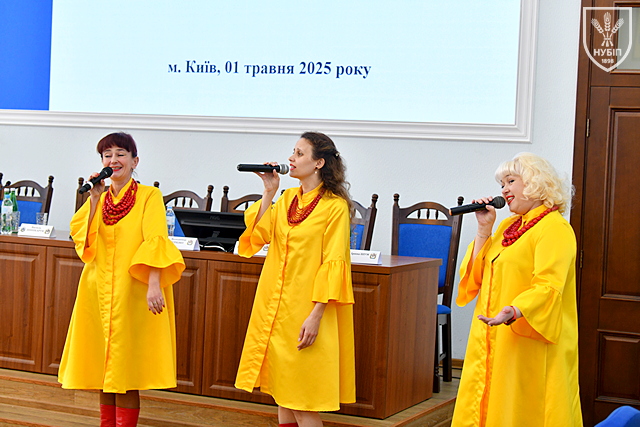
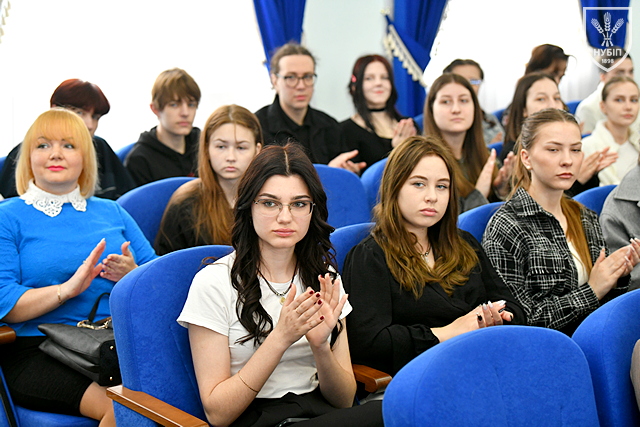
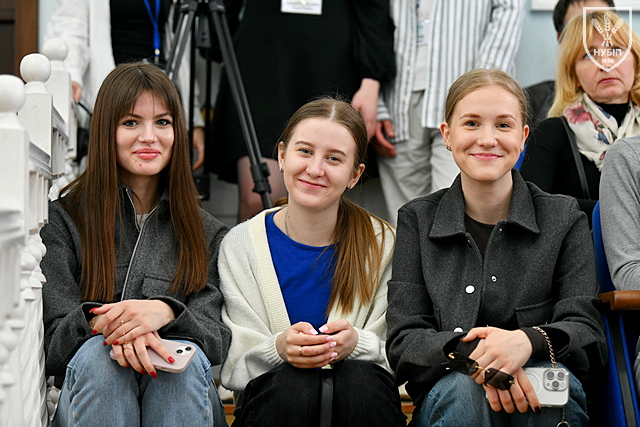
Oksana Chaika, Doctor of Science in Pedagogy, Associate Professor of Department of Foreign Philology and Translation at National University of Life and Environmental Sciences of Ukraine (Kyiv, Ukraine) and University of Luxembourg (Esch-sur-Alzette, Luxembourg) opened the second part of the conference. She delivered a scientific presentation on the topic “Countering Russian Propaganda through Translation.” Dr. Chaika emphasized that translation, traditionally viewed as a simple act of linguistic transfer, today plays a crucial role in global geopolitics, serving simultaneously as a bridge and a battleground of ideologies. Examining the role of translation in combating Russian propaganda, she described it as both pivotal and complex; highlighted that translators can take an active role in resisting ideological manipulation and preserving truth through critical analysis, ethical decision-making, and applying innovative translation strategies. By producing accurate and context-sensitive translations, they can help protect the integrity of democratic discourse and contribute to the global fight against propaganda.
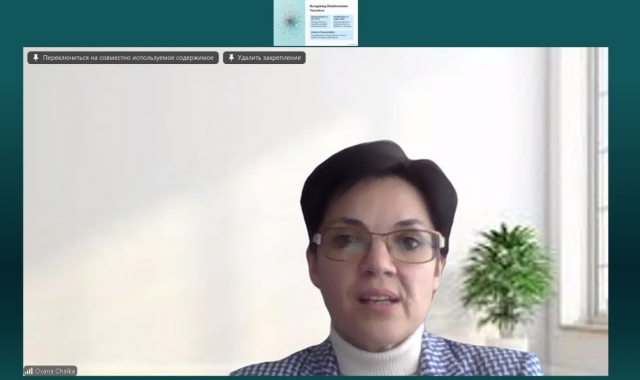
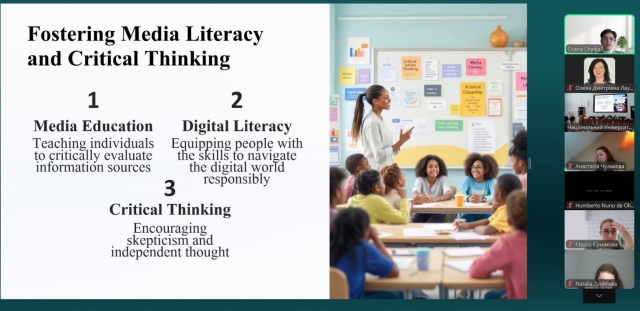
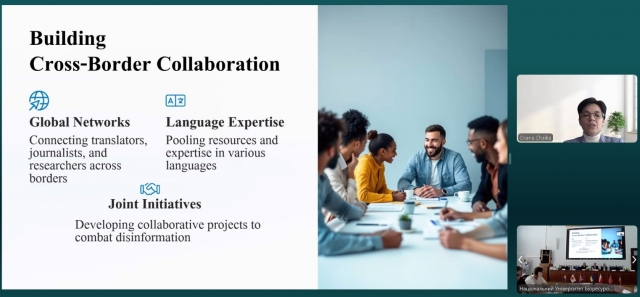
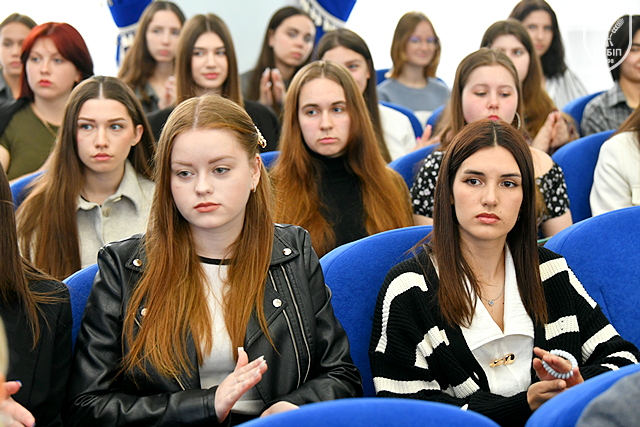
Mykola Maksiuta, Doctor of Philosophical Sciences, Professor of Department of Philosophy and International Communication at National University of Life and Environmental Sciences of Ukraine, shared his insights on existential visions of forgiveness in the education context. He concluded that historical awareness is a prerequisite for affirming an educated personality. Such a personality is distinguished by mastering a holistic image of a specific era, understanding the significance of its multifaceted processes, concepts, and phenomena of socio-political life and national-cultural development – an era seen as a living world, yet one that also includes gaps of guilt and crimes. This vision emphasizes the inevitability of punishment for crimes and full compensation for the consequences of military aggression. The vital necessity of possessing adequate knowledge of the past, a developed historical memory, and comprehensive understanding of modern war crimes and genocidal wars perpetrated by Russian aggressors against Ukraine and Ukrainians must continue to enrich the need for a thorough rethinking of historical knowledge, deepening historical memory, and fostering a modern culture of thought. This involves transforming information into a status of cultural and political existence of the individual. According to the speaker, the educational system should be directed toward fostering and affirming this transformation.
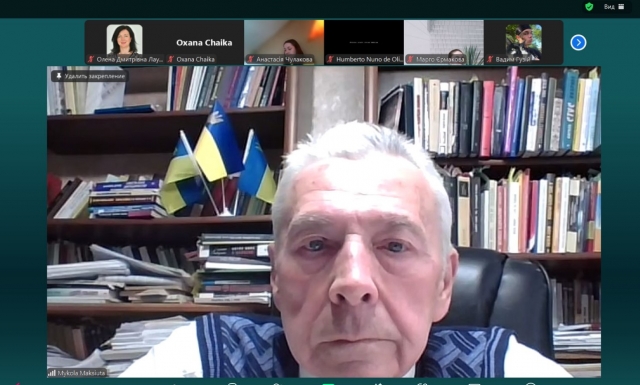
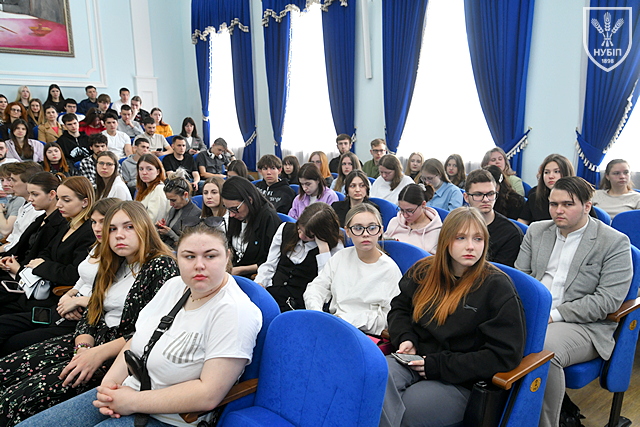
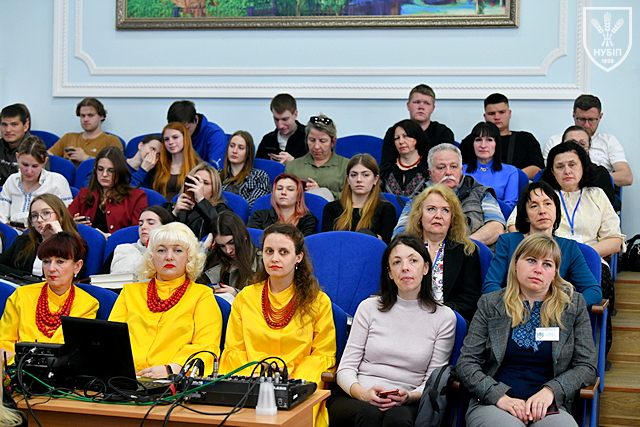
Dr. Sarah Cardey, Associate Professor, School Director of International Partnerships and Recruitment, Senior Fellow, HEA, Programme Director MSc Communication for Development, Programme Director MSc Applied International Development, Department of International Development School of Agriculture, Policy and Development at University of Reading (Reading, UK), delivered a scientific presentation “Communication and International Cooperation for Rural Development in Ukraine”.
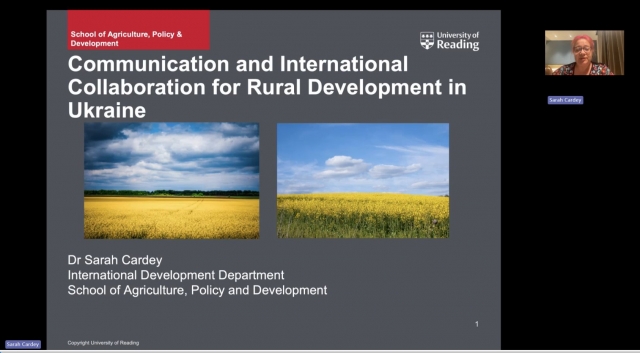
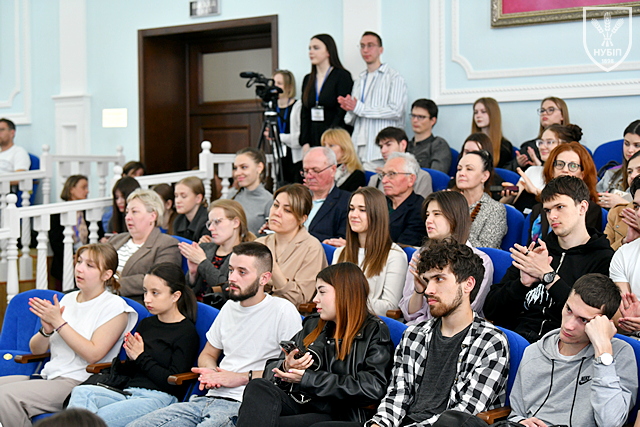
Sviatoslav Yusov, Candidate of Historical Sciences, Senior Research Fellow of Institute of History of Ukraine at National Academy of Sciences of Ukraine, examined the peculiarities of the informational space surrounding the Chernobyl Nuclear Power Plant disaster and the Three Mile Island Nuclear Power Plant incident from media, communication, and psychological perspectives. A comparative analysis has revealed that the informational space in both cases was a dynamic system, where the political regime, media mechanisms, and public sentiments determined the effectiveness or ineffectiveness of communication. The speaker noted that both total control over information and an uncontrolled flow of contradictory messages could have equally negative consequences for society. The conclusions drawn can be applied to modern information warfare, crisis communication, and the fight against disinformation.
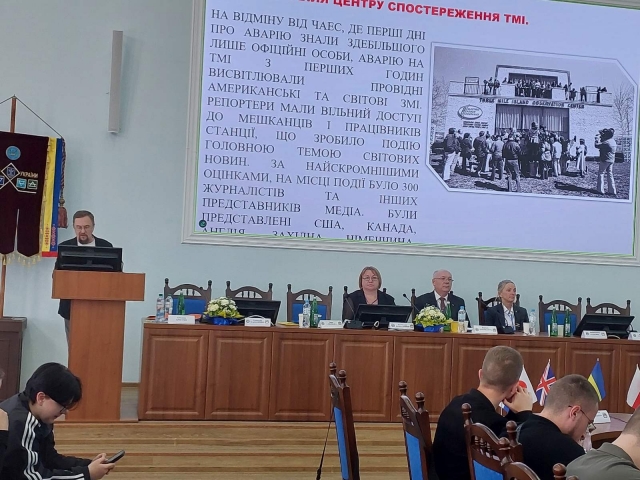
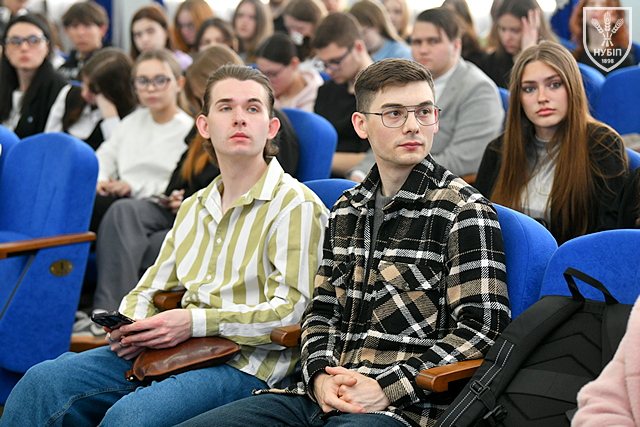
Vira Dodonova, Doctor of Philosophical Sciences, Professor, Professor of Department of Philosophy and International Communication at National University of Life and Environmental Sciences of Ukraine, delivered a scientific presentation “Intercultural Communication in the Focus of Dialogue between Ukrainian and European Values.” The speaker noted that intercultural communication, as a bilateral process, requires a tolerant attitude and a willingness to achieve mutual understanding among all participants. In the process of intercultural communication, values function as a moral imperative, playing a crucial role and ensuring its completeness. Intercultural communication operates on the levels of individual and societal values, which intersect and form a value-semantic complex. The features of European civilization are reflected in the system of values it has created, which have undergone complex transformations and dominate in the civilized world. The kinship of Ukrainian and European values highlights the shared ideals and cultures, making Ukraine an integral part of the European community.
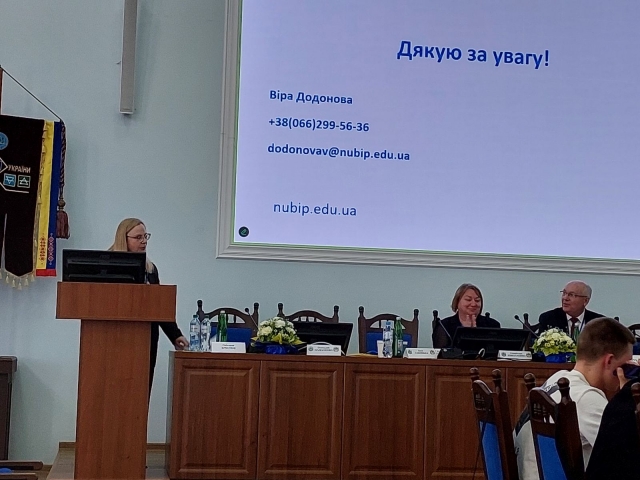
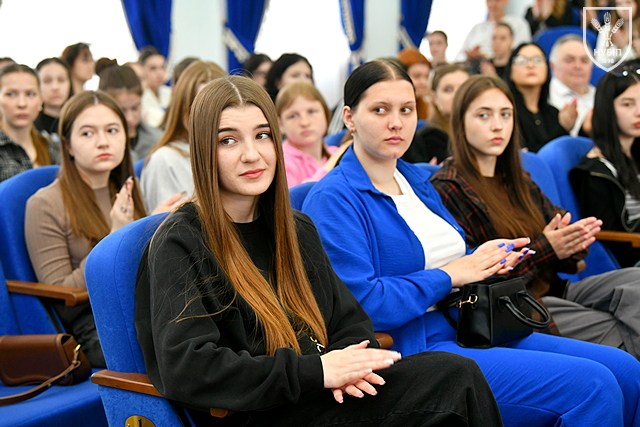
The scientific baton was taken over by first and second-level higher education students who presented the results of their own research in English: Maryana Biloshapka (“Philosophy of Language and its Role in Intercultural Understanding”), Vadym Horovyi (“Role of Translators in International Relations: Challenges and Solutions"), Yuliia Kravchenko (“The Rhetorical and Semantic Shifts in Zelenskyy’s Address to Russian Citizens (February 24, 2022)”), Vladyslava Yurchenko (“Ukraine’s Image in the Context of Cultural Diplomacy: the Role of Intercultural Communication”), Sofia Kovalova (“Modulation in Zelenskyy’s Speech in 2023 at the United Nations General Assembly”), Sofiia Brovchenko (“Fake News and Disinformation in International Communications”), Oleksandra Artamonova (“The Influence of Translation Strategies on the Perception of Ukrainian Political Speeches Abroad”), as well as Anna Pashtetska, Kateryna Masliak, Karina Tymoshchuk, and others. The proper level of initial research, their well-argued presentations, research tact, and fluent command of a foreign language confidently highlighted the new generation, who will soon represent domestic science on the international stage.
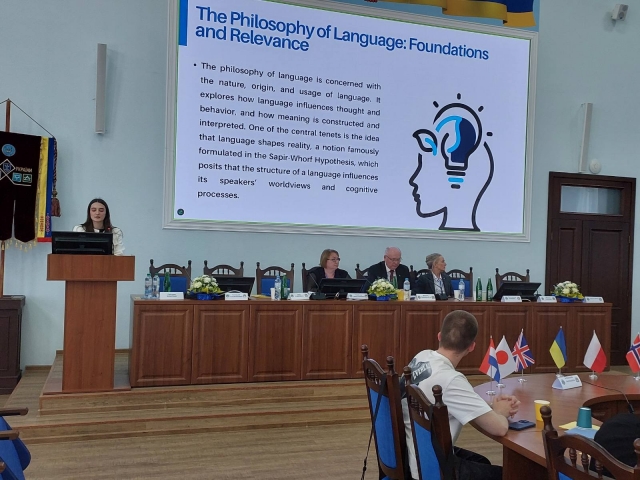
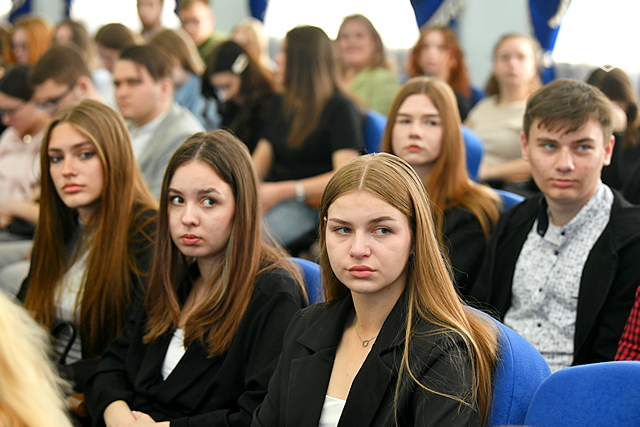
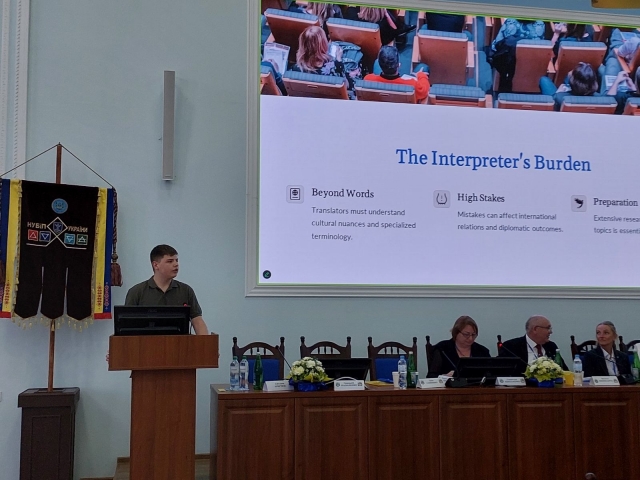
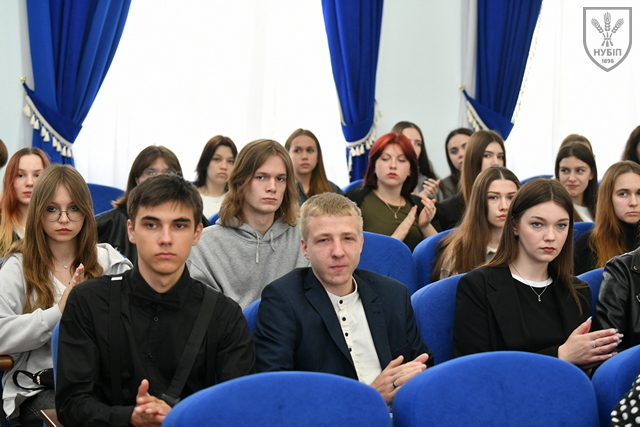
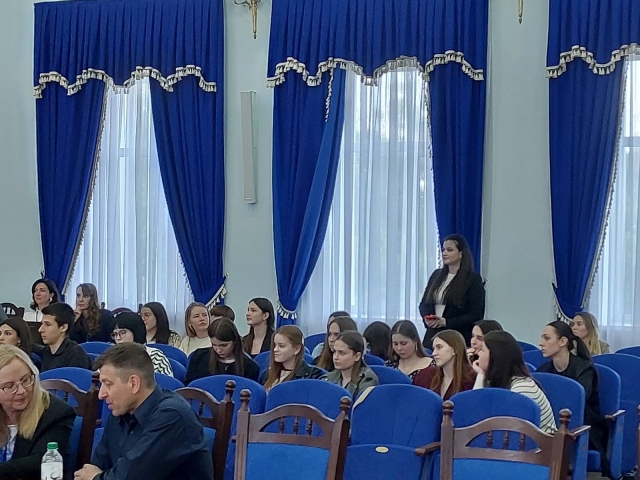
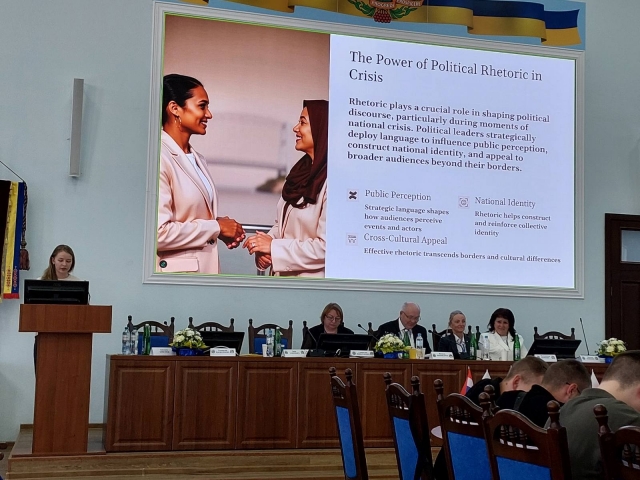
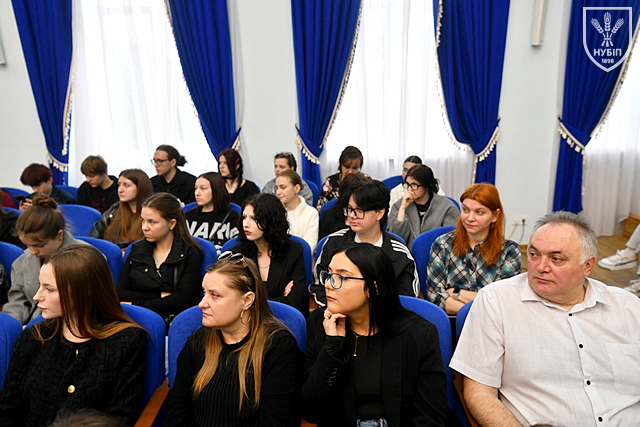
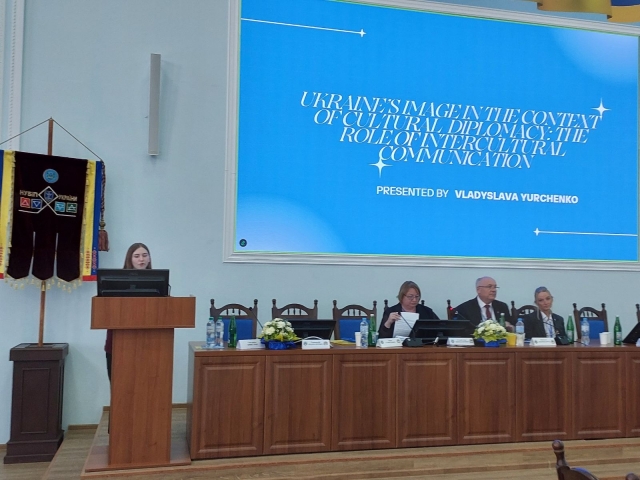
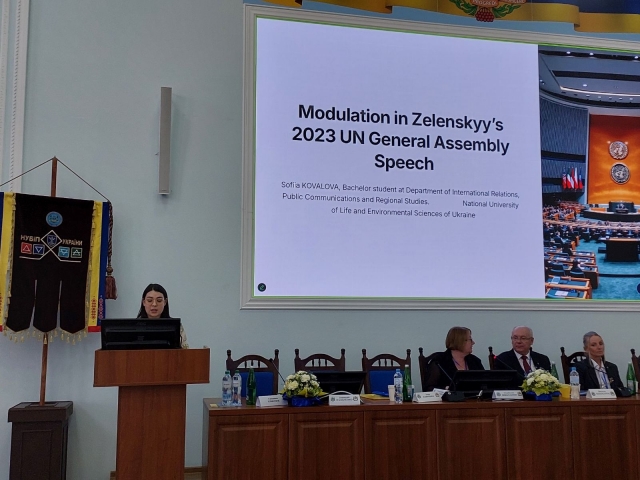
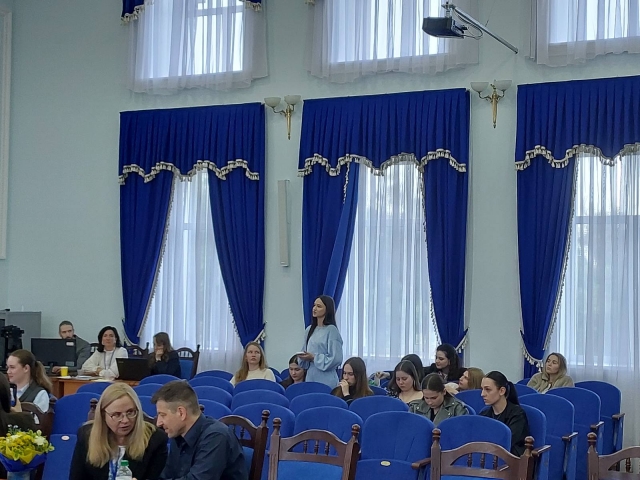
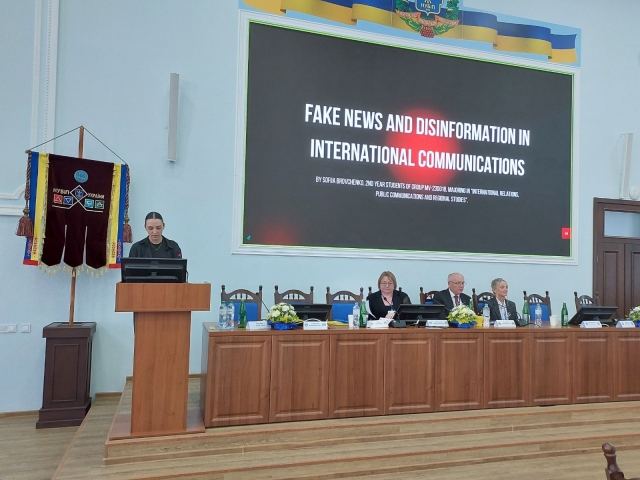
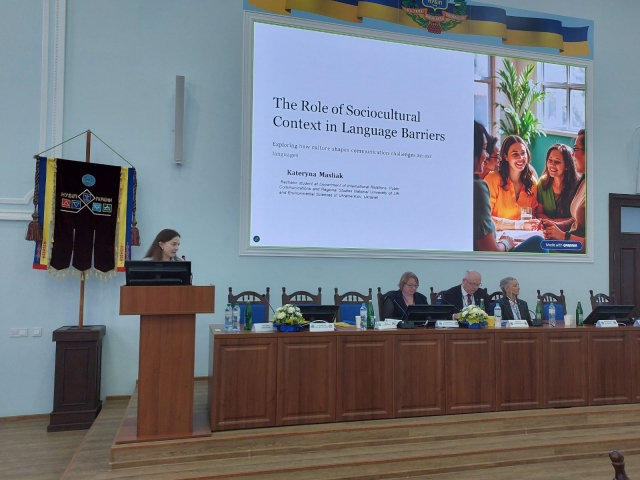
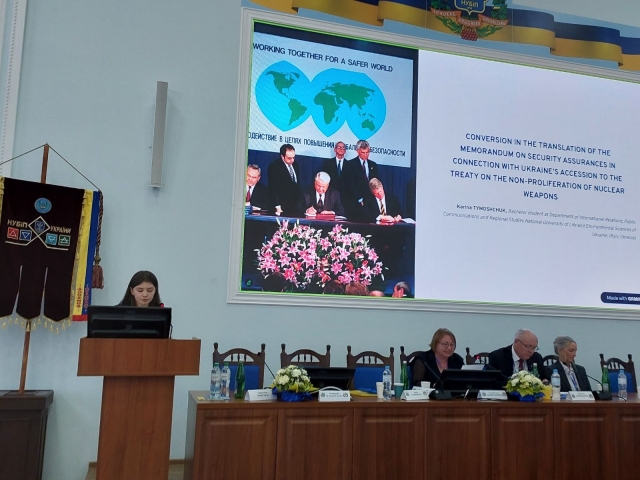
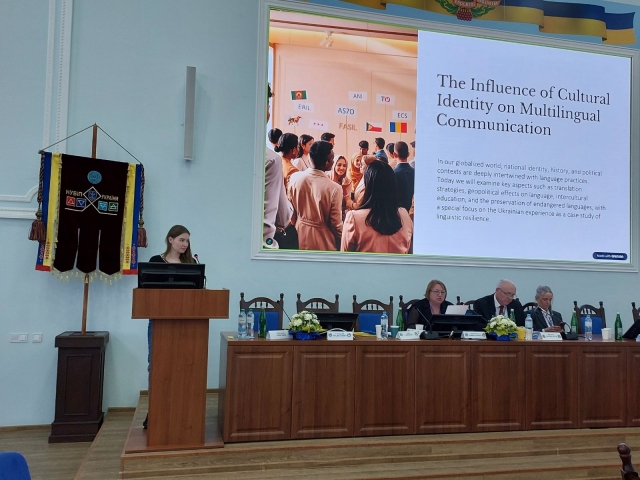
We thank conference participants and guests for their active engagement and discussions on issues of international and intercultural communication. The conference has provided a powerful impetus for new ideas on shaping the state’s positive image and implementing them in practical terms, which resonated widely in the academic community both in Ukraine and abroad. The organizing committee has received expressions of gratitude from scholars in Poland, the United Kingdom, and Luxembourg.
We thank the Armed Forces of Ukraine, who heroically defend Independence, Freedom, and Peace – the eternal values of the Ukrainian people, embodied in the image of a free and unbreakable Ukraine!
Olena Balalaieva,
Associate Professor of Department of Philosophy and International Communication



